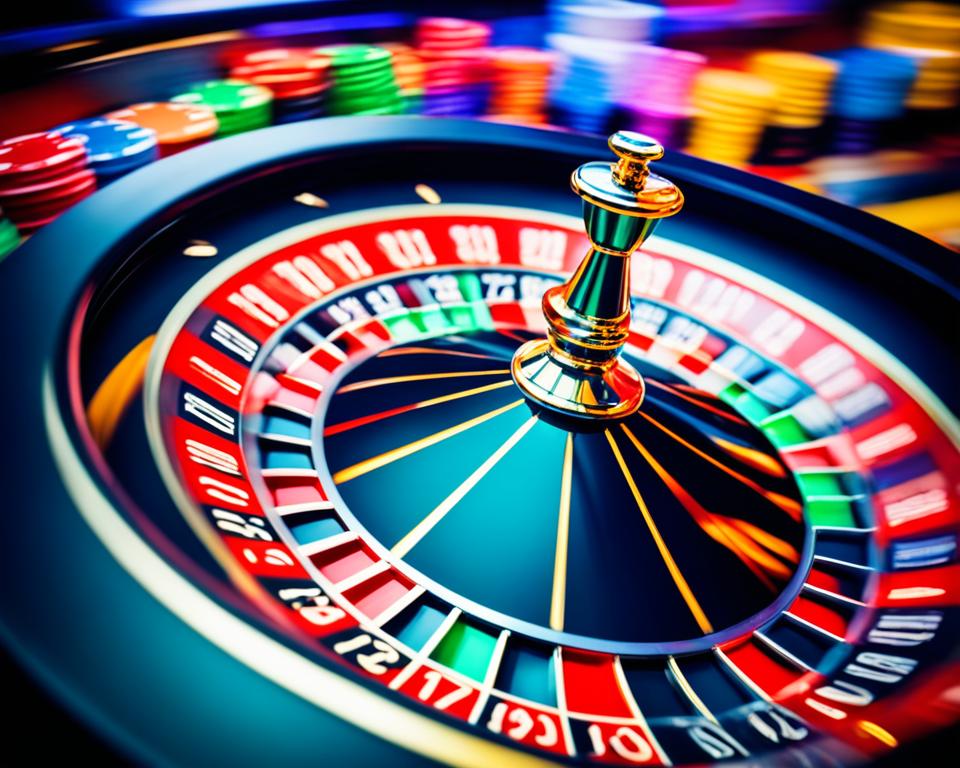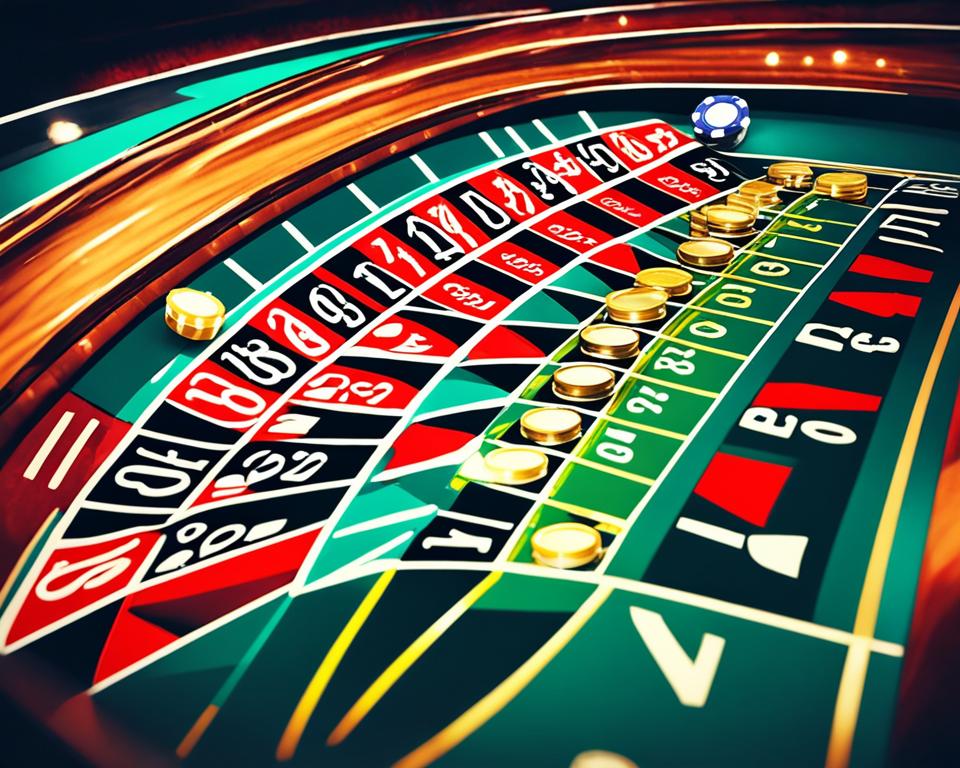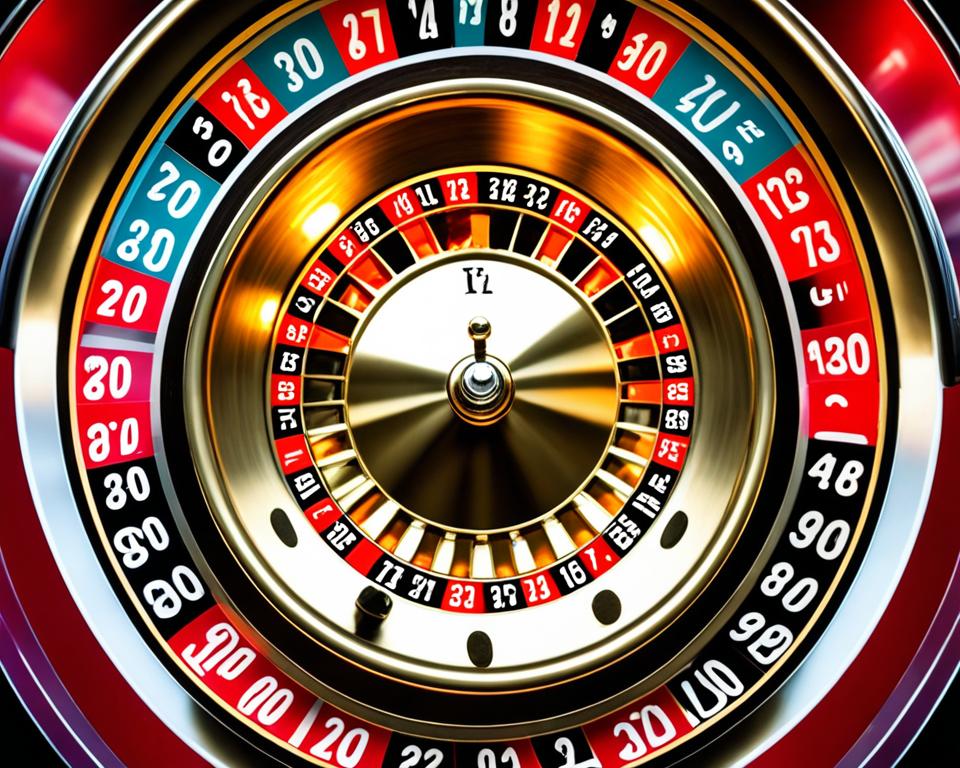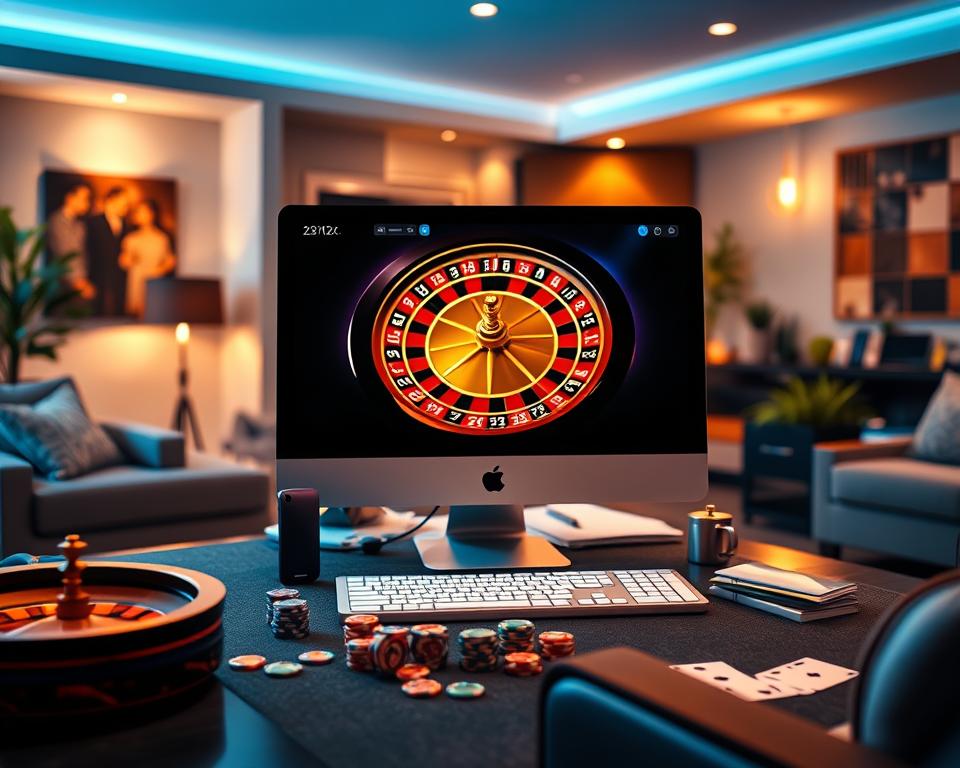Roulette has been thrilling casino fans for centuries. It’s known for its glamour and the excitement of guessing the outcome. Let’s dive into the roulette meaning and see how it has changed over time. We’ll look at the roulette game rules, roulette odds and payouts, and strategies for playing this game of luck and skill.
The history of roulette takes us back in time. It shows us how the game has changed and the different roulette variations that exist today. We’ll see how the classic French, American, and European roulette wheel layout has evolved. We’ll also explore the modern versions like online roulette and live dealer roulette.
As we learn more about roulette meaning, we’ll look at roulette strategies. These strategies help players understand the different bets and roulette etiquette. Knowing these can help players make better choices and enjoy the game more.
The roulette meaning is more than just the game itself. It’s about its history, strategies, and safe gambling practices. Join us as we delve into the world of roulette. Let’s discover the true essence of this classic game of chance.
Understanding the Roulette Meaning
Roulette is a game of chance that has won the hearts of players all over the world. It comes from the French word for “little wheel.” This game has a long history, starting in the 18th century in Paris’s gambling halls.
Origins and Etymology of Roulette
The game of roulette has roots in ancient games like the Italian Biribi and the Chinese Pai Gow. But the modern roulette we know today is thanks to French mathematician Blaise Pascal. He created it by accident while working on a perpetual motion machine in the 17th century.
Defining the Game of Roulette
Roulette is all about betting on the outcome of a spinning wheel. The wheel has numbers and colors, and a small ball spins around it. When the ball stops, the winning bets are decided by the number and color it lands on.
The goal is to guess where the ball will stop. This mix of chance and strategy has made roulette a favorite for centuries.

“Roulette is not just a game of chance, but a fascinating interplay of probability, strategy, and the thrill of the unknown.”
Whether you’re new to roulette or have played for years, learning about the roulette meaning and its history can deepen your love for this classic casino game.
Roulette Game Rules
Learning the basics of roulette is key for anyone wanting to dive into this exciting game. The roulette game rules are simple, making it easy for both new and seasoned players to join in.
The roulette table has a wheel with numbers from 1 to 36, plus a green pocket for the 0 (or 0 and 00 in American roulette). Players put their roulette bets on the table, which shows different numbers, colors, or outcomes.
- Inside Bets: These bets are on single numbers or small groups of numbers on the table.
- Outside Bets: These cover bigger areas like red/black, odd/even, or high/low numbers.
After placing bets, the dealer spins the wheel one way and the ball the other. When the ball lands in a pocket, the winning roulette bet is found, and payouts are given.
“The beauty of roulette lies in its simplicity. With a few straightforward rules, players can engage in the thrill of the spin and the anticipation of the outcome.”

Getting to know the roulette game rules helps players feel confident and smart. By learning about the types of roulette bets and how the game works, players can make better choices and enjoy their roulette time more.
Roulette Odds and Payouts
Knowing the odds and payouts in roulette is key for players. The roulette house edge is the casino’s edge. It affects the chance of winning and the payouts for different bets.
House Edge in Roulette
The house edge changes with the game type. In European roulette, it’s about 2.7%. American roulette has a higher edge at 5.26%. This is mainly because American roulette has a double zero, making the casino’s edge bigger.
Probability and Payouts for Different Bets
- Straight-up bets (a single number) are the toughest to win but pay the most at 35:1.
- Split bets (two adjacent numbers) offer a better chance at 17.1% and a payout of 17:1.
- Corner bets (four numbers) have a 10.8% chance and pay 8:1.
- Even-money bets, like red/black or odd/even, are the most likely to win at 48.6% but pay the least at 1:1.
Players need to weigh the roulette odds and payouts when betting. Thinking about the probability and rewards helps them make better choices and manage their money.
“The house edge is the casino’s mathematical advantage over the player. Understanding it is key to making informed decisions when playing roulette.”
Roulette History
The history of roulette goes back to the 18th century in France. It started from the Italian game “Biribi” and the French game “Roulette.” Soon, it became a symbol of elegance and chance across Europe.
Early Beginnings and Evolution
In 1796, Frenchman Blaise Pascal, a famous mathematician and physicist, invented the modern roulette game. The game changed over time. The American version came in the 19th century with an extra double-zero pocket.
Roulette spread around the world, changing to fit local tastes and gambling cultures. The European version, with a single-zero wheel, is common in many places. The American version is still big in North America.
“Roulette has been a symbol of elegance and chance for centuries, captivating players and enthusiasts alike.”
Roulette’s evolution shows its lasting appeal and the creativity of its fans. Today, it keeps changing with online roulette and live dealer games. This has made it even more popular worldwide.
Roulette Strategies
Playing roulette is more than just luck. Smart players use roulette strategies to boost their chances. Whether you’re experienced or new, learning about roulette betting systems can help. It can give you new insights and maybe even better odds.
The Martingale system is a well-known strategy. It means doubling your bet after a loss to try to win back what you lost with the next win. But, this method can be risky. A series of losses can quickly use up your money.
The Paroli system is another strategy. It’s about increasing your bet after a win to keep the winning streak going. This way, you can manage your money better. But, it might not lead to as big wins as the Martingale system.
The d’Alembert system is for those who want a balanced strategy. You increase your bet by a set amount after a loss and decrease it after a win. This method tries to lessen the effect of losing streaks while still allowing for wins.
“Mastering roulette strategies is not about guaranteeing a win, but rather about making informed decisions and managing your risks effectively.”
Remember, roulette strategies don’t guarantee you’ll win. Roulette is unpredictable, and the house always has an edge. Use these strategies wisely, and never bet more than you can afford to lose.
- Understand the pros and cons of different roulette betting systems
- Explore strategies like the Martingale, Paroli, and d’Alembert systems
- Manage your bankroll and risks effectively
- Recognize that no strategy can guarantee a win in the long run
Types of Roulette Bets
Roulette is a game of chance with many betting options. Knowing the different types of bets is key to making good strategies and winning more. Let’s look at the main types: inside and outside bets.
Inside and Outside Bets Explained
Inside bets are placed on the roulette table’s grid. They focus on specific numbers or groups of numbers. These bets have higher payouts but are harder to win. Examples include betting on a single number, two next to each other, or four numbers.
Outside bets are on the table’s outer sections. They cover more outcomes and have lower payouts but are easier to win. Popular outside bets are betting on red or black, even or odd, and high or low numbers.
Knowing the different roulette bets helps players make better choices. Whether you like the excitement of inside bets or prefer safer outside bets, it’s important to know your options. Pick the bets that fit your playing style and goals.
Roulette Wheel Layout
The roulette wheel is key to the game, and knowing its layout is vital for players. The roulette wheel layout has a circular design with pockets for numbers. These pockets alternate between red and black, with a special spot for the zero (or double zero in the American version).
Understanding the Wheel Design
The roulette wheel design is carefully made for fun and unpredictability. Numbers are not in order; they follow a pattern to keep the game exciting. This layout stops players from guessing the spin’s outcome, keeping the game fair.
The wheel has 37 pockets in the European version or 38 in the American version, with a double zero in the American version. Numbers range from 1 to 36, with the zero and double zero in their own section.
The red and black pockets add to the game’s look and help players keep track of past spins.
Knowing the roulette wheel layout helps players see the game better and make smarter bets. By understanding the wheel, players can appreciate the game’s mechanics and the luck involved in winning.
Online Roulette
Online roulette has changed how we play the classic casino game. Now, players can enjoy it from home. It offers both benefits and downsides that are important to know.
Advantages of Online Roulette
Playing online roulette is easy to start. You can play at any time without going to a casino. There are many types of roulette online, so everyone can find one they like.
Online roulette is also very convenient. You can play on your computer, phone, or tablet. This means you can play whenever you want, without worrying about crowds or dress codes.
Disadvantages of Online Roulette
Online roulette has its downsides too. Some players miss the real casino feel and social interaction. They prefer the excitement of being in a casino.
Also, picking a safe online roulette site is key. You need to make sure the site is trustworthy to keep your personal and financial info safe.
Overall, online roulette is a great choice for those who want to play casino games easily. But, it’s important to think about the pros and cons before playing responsibly.
Live Dealer Roulette
Live dealer roulette has changed the online gambling scene. It combines the ease of online games with the real feel of a casino. This makes for a unique and engaging experience for players.
At the core of live dealer roulette is a live video feed. It takes players straight to the roulette table. They can see the dealer spin the wheel and watch the ball roll in real-time. This adds a thrill that’s hard to find in online games.
One big plus of live dealer roulette is talking to the dealer. Players can chat with the dealer to ask questions, place bets, and get tips. This makes the game more social and engaging, closing the gap between online and real casinos.
Live dealer roulette stands out for its true-to-life visuals. The high-quality video and real-time action make players feel like they’re at a real roulette table. This realism adds to the excitement, making it a top choice for those wanting a genuine casino feel.
Whether you’re new to roulette or a pro, live dealer roulette lets you enjoy casino excitement from home. It’s a mix of convenience, interaction, and realism that’s winning over many online roulette fans.
“Live dealer roulette offers the best of both worlds – the convenience of online gaming with the authentic thrill of a real-life casino experience.”
Roulette Etiquette
Understanding roulette etiquette can make the game better for everyone. Following roulette table etiquette shows respect for the game and others. It’s important to know the roulette dos and don’ts for a good time.
Dos and Don’ts at the Table
Here are key etiquette rules for a positive table atmosphere:
- Do wait for the dealer to finish the spin and call the winner before betting.
- Do be careful with your chips and don’t throw them on the table.
- Do make your bets clear and simple for the dealer.
- Do don’t touch the roulette wheel or block the dealer’s view.
- Don’t interrupt the dealer or other players during the game.
- Don’t lean on the table or move suddenly to not disrupt the game.
- Don’t be loud or disturb others with your behavior.
By sticking to these roulette etiquette rules, you help make the table a nice place for everyone. This ensures a fun and respectful game for all.
“Roulette etiquette is not just about following the rules – it’s about creating a positive and respectful atmosphere for everyone at the table.”
Roulette Meaning: Exploring the Game of Chance
Roulette is a thrilling game of chance that has been exciting players for centuries. Its unpredictable nature is what makes it so exciting. The spin of the wheel and the ball’s fall decide the winner. This unpredictability draws players to the table, seeking the thrill of the unexpected.
The roulette game of chance tests your luck. Players bet on where a small ball will land on a spinning wheel. There are many betting options, from simple to complex. The game is not just about winning big. It’s about enjoying an age-old tradition of chance and excitement.
But, roulette also comes with risks. Players need to understand the roulette meaning and the chance of winning or losing. It’s important to gamble responsibly to avoid emotional and financial problems. Seeing roulette as a game of chance lets players enjoy it while staying safe.
“The essence of roulette is that it is a game of pure chance, where the outcome is determined solely by the spin of the wheel and the fall of the ball. This unpredictability is both the thrill and the risk of the game.”
The roulette meaning is its timeless appeal as a game of chance. The excitement of the spin keeps players coming back. By understanding roulette, players can enjoy it safely, making sure it brings joy, not harm.
Roulette Variations
In the world of roulette, players find many variations to pick from. From the classic European roulette to the exciting American roulette, each version has its own special twist. Knowing these differences can change how you play and your chances of winning.
French, American, and European Roulette
The main differences between French roulette, American roulette, and European roulette are in their wheel layouts and the number of zero pockets. European roulette has just one zero pocket. American roulette has both a single and a double zero, making the house edge higher. French roulette uses special rules like “La Partage” and “En Prison,” which can lower the house advantage.
Players can try different betting options in roulette, from inside bets on single numbers to outside bets on groups of numbers or colors. Each bet has its own payout ratio. Choosing the right roulette variant is key to getting the most out of your bets.
“Roulette is not just a game of chance; it’s a game of understanding the nuances and making informed decisions.”
Learning about the different roulette variations helps players make better choices. They can adjust their gameplay to fit their preferences and how much risk they’re willing to take. Whether you like the classic European style or the thrill of the American wheel, roulette offers fun for players at all levels.
Responsible Gambling
Roulette is thrilling, but it’s key to play with responsibility and balance. While gambling is fun, it can be risky, especially for those prone to addiction. We’ll look at why responsible gambling matters and where to find help for gambling issues.
Gambling addiction is a big issue that affects life, relationships, and money. Signs include not being able to control bets, chasing losses, and putting gambling first. It’s important to notice these signs and get help before things get worse.
There are many groups and services to help with gambling addiction. They offer counseling, support groups, and tips for a healthy approach to roulette and other gambling. By focusing on responsible gambling, players can have fun without harming their well-being.



